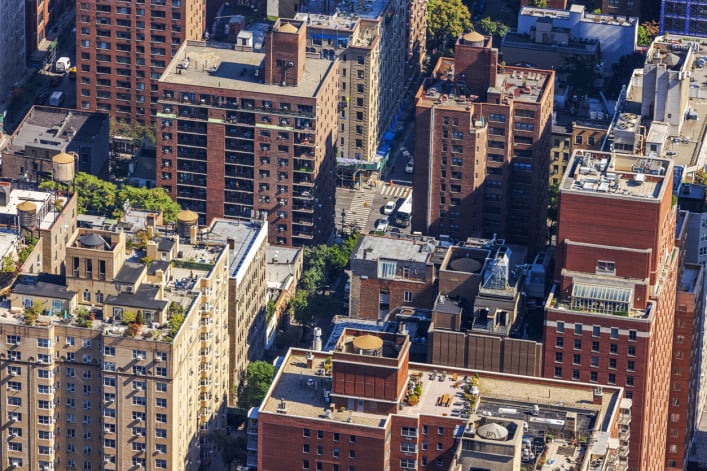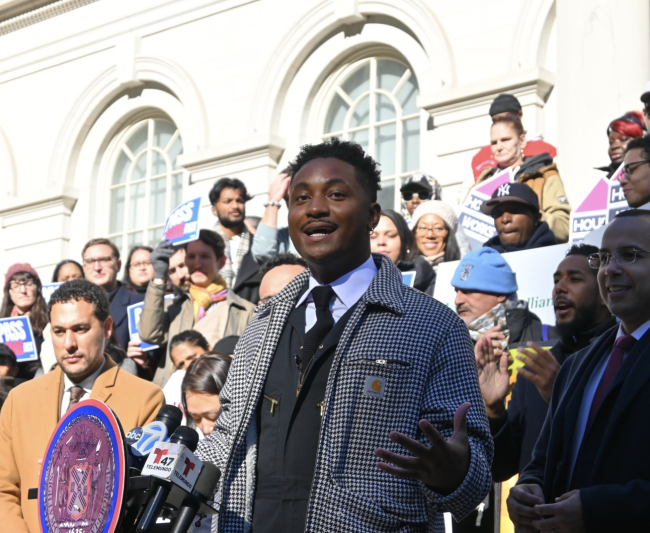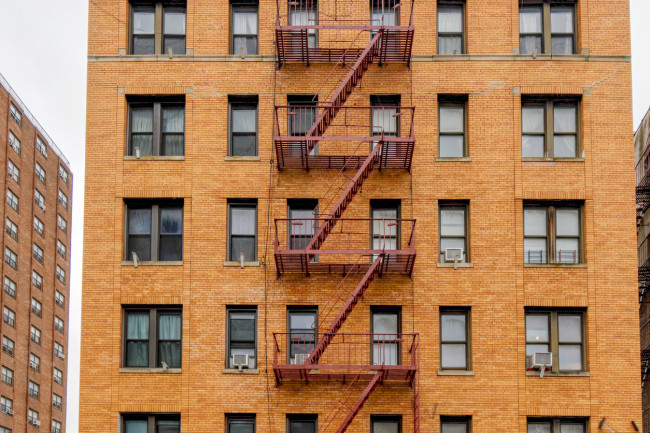FARE Act takes effect: What NYC renters need to know about the new broker fee law
- Judge's ruling clears the way for the broker fee law to be implemented
- The law shifts responsibility for most broker fees from renters to landlords

The FARE Act represents major change for the NYC rental market, which has been an outlier in having renters compensate brokers hired by landlords.
iStock
New York City’s new law that shifts responsibility for most broker fees from renters to landlords will go into effect tomorrow after a judge denied a powerful real estate lobby's attempt to prevent the law's implementation.
Since the fee is usually 12 percent of the annual rent, the Fairness in Apartment Rentals (FARE) Act removes a significant upfront cost to renters—saving renters an average of $5,404, according to a new StreetEasy report. It’s a major change for the NYC rental market, which has been an outlier in having renters compensate brokers hired by landlords.
But the cost is not going away completely. Landlords have been rolling the fees into higher rents in anticipation of the FARE Act’s start—in effect spreading the cost over the term of the lease, which renters will likely find easier to pay. StreetEasy says the increase is about 5.3 percent but there are reports of higher rent increases (more on this below).
In November, the City Council approved the Fare Act, introduced by Council member Chi Ossé, with a veto-proof majority of 42 members. Mayor Eric Adams did not sign the legislation, which meant it would take six months to go into effect rather than immediately.
The Real Estate Board of New York, the powerful trade group, along with several brokerages, filed a lawsuit last year to block implementation of the law, arguing that it violates the First Amendment, among other claims. However, Judge Ronnie Abrams denied REBNY's request for a preliminary injunction, which would have prevented the FARE Act from going into effect while the lawsuit was pending, The Real Deal reported. The judge also dismissed REBNY's claim that the law is unconstitutional, but allowed the suit to continue in regard to an allegation that the FARE Act wrongfully interferes in private contracts.
James Whelan, president of REBNY, said the group was disappointed that the preliminary injunction was denied.
"New Yorkers will soon realize the negative impacts of the FARE Act when listings become scarce, and rents rise. We will continue to litigate this case as well as explore our avenues for appeal,” he said.
If you’re hunting for a rental, here are some of the changes you can expect as a result of the FARE Act and what you should watch for.
Fines for violating the FARE Act
The Department of Consumer and Worker Protection is the city agency charged with enforcing the new law. A broker can be fined $500 to $2,000 for illegally collecting fees.
The New York Department of State can impose additional fines of $2,000 and could revoke a broker’s license on top of any penalties under the FARE Act, Mercedes Padilla, spokeswoman for the Department of State, previously told Brick.
Renters can file complaints to the DCWP by calling 311 and to the DOS by filling out this form and emailing it to the agency.
Lower upfront cost to renting
The biggest change most renters will feel is the absence of an expensive broker fee (except for renters in the scenario below).
Kenny Lee, an economist at StreetEasy, told Brick that the FARE Act “a big win for renters.”
Lee recently calculated the savings for NYC renters signing a lease in a new report, which predicts the new law will lower average upfront costs for rentals currently charging a broker fee by 41.8 percent, from $12,942 to $7,537. (Upfront costs include first month’s rent and a security deposit equivalent to one month’s rent.)
When you do need to pay a broker fee
One aspect of renting in NYC remains the same: Renters who hire an agent, for example to show them multiple apartments in their budget, will still be required to compensate the broker.
But this relationship is supposed to be clearer under the FARE Act. An agent is required to disclose whether they work for the landlord. If the broker is working directly for you and you agree to sign a contract, then you will pay their fee, typically 12 percent of the annual rent, but it can range from 10 to 15 percent. The fee is supposed to be negotiable.
Another aspect of the FARE Act is that all fees a renter must pay are defined in advance in a renter agreement, such as fees for lost keys, pets, and move-in/move-out.
Slightly higher monthly rents…
One criticism of the FARE Act is that it will send rents skyward but Lee contends rents are not likely to increase significantly beyond market trends. His report found properties that switched to no-fee ahead of implementation increased rents by an average of 5.3 percent, only 0.7 percent above the rest of the market.
That suggests “property managers will continue to absorb much of the additional cost, as they have in the past,” Lee wrote. Market conditions ultimately set rents, he noted. (NYC rents have been setting new records in recent months.)
And he predicted that a large share of property managers will continue to work with rental agents. During the pandemic in 2021, when owners had a hard time finding renters, 80.3 percent of rentals that did not charge the tenant a broker fee were represented by brokers, Lee said. This year, the share of all no-fee rentals represented by agents is 56.9 percent.
…or much higher rents
StreetEasy’s 5.3 percent average seemed conservative to Rachel Fiegler, co-founder of the Pinpointe Group, a boutique brokerage.
“Landlords we work with have bumped asking rents 8–12 percent to cover the one‑month broker fee they’re now responsible for,” she said.
Bill Kowalczuk, a broker at Coldwell Banker Warburg, said he has already raised rents on apartments he represents if the landlord agrees to cover the fee—and the increase has been higher than 5.3 percent as well, for example an apartment that rented 18 months ago at $12,000 for year one and $12,300 for year two is now $12,950 and $13,050 for the second year, with the landlord covering the broker fee.
“We recently leased a studio in a doorman building in Brooklyn. The landlord paid the fee, but we achieved $4,150 a month, the highest rent ever paid in that building,” Kowalczuk said.
“The landlords came out ahead by increasing the rent and covering the fee, rather than settling for a lower rent without paying it. The tenants, on the other hand, will have much greater out-of-pocket rent costs the longer they stay in the apartment, since rent increases will always be calculated on the inflated rent,” he said.
A permanent broker fee?
Kowalczuk was echoing one of the criticisms of the FARE Act: When landlords roll broker fees into rents, tenants will be stuck paying the fees after they renew.
While a renter will pay less at lease signing, “with the fee baked into the rent, tenants will pay it every month and again at renewal, plus the landlord’s annual increase. Spread over a two‑year stay, many renters will end up paying more than the one‑time upfront fee,” Fiegler said.
But Lidor BarDavid, co-founder and chief marketing officer of apartment listing and review platform openigloo, doesn’t think that outcome is inevitable or supported by what his company is seeing.
Nearly half of NYC apartments are protected by rent stabilization and many market-rate units are covered by Good Cause Eviction law, which means landlords can’t raise rents beyond what the law allows (currently 8.8 percent).
“So the idea that broker fees will be baked into higher base rents doesn’t even apply to a large segment of the housing stock,” BarDavid said.
He said that many market-rate landlords “already choose to cover the broker fee to make their listings more competitive, and they’ve done so without raising the rent…Asking someone to come up with $4,000-plus on average in fees just to sign a lease is a much heavier burden than a modest rent adjustment spread over a year, if one even happens.”
Harder to qualify for apartments
Higher rents do mean renters need to show more income to qualify for apartments. NYC landlords prefer renters who earn annual salaries of 40 times the monthly rent.
Fiegler provided the following scenario: A one bedroom that was $3,500 now lists for $3,780–$3,900. Instead of showing $140,000 in annual income, a renter must prove they make roughly $150,000 or bring on a guarantor who earns $300,000.
“So the policy helps with up‑front cash, but it also knocks borderline applicants out of contention,” she said.
Online inventory may drop
Fiegler said some landlords have workarounds that could impact what listings you see online.
“Some smaller landlords tell us they’ll self‑list on StreetEasy to dodge the fee,” she said. “Others plan a hybrid strategy: Keep the cream online and hold back the rest, forcing renters to hire their own agent if they want to see every option.
“I expect an overnight dip in the visible inventory count on June 10th and 11th, followed by a gradual climb as the market finds its footing,” she added.
Jason Haber, a broker at Compass, expects a more dramatic impact on listings.
"We are about to witness a huge decline in online supply, which will only make it harder and more expensive for tenants to find an apartment. Tenants will be looking for apartments as if it were 1999. Off-market listings, e-mail blasts, and other less efficient systems will percolate, all to the detriment of the very tenants this law is intended to help,” Haber said.
Consider a two-year lease
There are always pros and cons to locking in your rent with a two-year lease instead of one year and the FARE Act adds a new wrinkle to this discussion.
Abigail Palanca, an agent at SERHANT, said she is fielding requests from renters “to lock in their rate for two years, as they realize the savings, especially if they are hoping to be there long-term.”
The choice depends on where rents are going (they’re climbing) and if you like the apartment enough to stay put. Of course, a landlord has to be amenable to the longer lease term. But if you get a two-year lease, you are locking in the amount you pay and protecting yourself from rent increases after one year, a consideration if your base rent includes the broker fee.
—Editor's note: This article was updated after publication to include comment from REBNY President James Whelan.
You Might Also Like




























